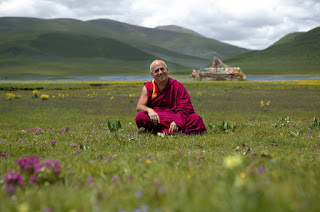Thursday, July 01, 2021
Point of Focus
Wednesday, April 14, 2021
Stillness v Absence
Yoga is stilling the waves of the mind. I think of Financial Yoga as stilling the waves of money anxiety. I don’t see the point of meditation as getting rid of thought/money waves. You aren’t getting rid of the challenges. They are still there. There are important problems we need to grapple with. Which makes it important to worry, in the sense that it is important to think. What you are trying to avoid is those thoughts being given more attention than they should be. Being aware of them rather than pretending that they are not there. Acceptance of the waves, without giving them the power to dominate you. You want to think of the future. You want to think of the past. You want to consciously, and selectively, connect the two in the present. To compound what is important to you, and to make different mistakes that cancel each other out. Stillness is not absence. The waves are part of your path, and the aim is to create behaviours that draw energy from them.
Thursday, October 01, 2020
Building a Practice
“Restraining of thought waves means analysing your thoughts constantly, it does not mean suppression of thoughts.” Swami Durgananda (commentary on “Yoga Sutras of Patanjali”). Financial Waves can’t simply be ignored. If you don’t learn to control money, it can control you. Through study and patient reflection, you can develop a system that works for you. Letting go of distortions, delusions, and obstacles. Finding a way to go deeper into problems and resolving them. Rather than letting unhelpful money anxiety become the driving force in our lives. Whether the problem is misunderstanding, accepting false perceptions of others, or deep soaked prejudice from the way the world is temporarily (but doesn’t need to be). Build a practice to concentrate on what matters.
Wednesday, November 27, 2019
Clarity and Transition
Wednesday, October 23, 2019
Draw Breath
Tuesday, June 12, 2018
Making Space
Tuesday, June 05, 2018
Improving the Conversation
Wednesday, May 30, 2018
Saucepan
Wednesday, August 02, 2017
Gas Mask
Friday, June 30, 2017
Five Points
Sunday, August 28, 2016
Self-Expression – The Dalai Lama & Desmond Tutu (Tim)
Friday, August 26, 2016
Self-Discipline - Mo Farah (Tim)
Thursday, August 25, 2016
Self-Awareness – Matthieu Ricard (Tim)
Tim Casteling
Part 4 of a 7-part series on Self-Awareness
(1) Self-Doubt (2) Self-Criticism (3) Self-Discovery
Friday, June 17, 2016
Space Makes Time
Tuesday, January 12, 2016
Finding a Moment
Friday, September 18, 2015
Kissing Babies
Friday, October 31, 2014
Finding Flow
Saturday, September 06, 2014
The 5 + 2 Points
1) Proper Exercise
2) Proper Breathing
3) Proper Relaxation
4) Proper Diet
5) Positive Thinking and Meditation
When not feeling right, it is a very useful checklist to pin-point where you are struggling. The two points I would add to the list are
6) Proper Flow
This is a concept articulated by Mihaly Csikszentmihalyi as 'a state of concentration or complete absorption with the activity at hand and the situation. It is a state in which people are so involved in an activity that nothing else seems to matter' For everyone, this is different. Discovering what gives you Flow and putting in the effort required to experience that state is I believe both an engine for personal satisfaction, and for the world moving forward. Like every part of the body has a function, the fact that what provides each of us with Flow is different, allows us to create magic together.
and
7) Proper Relationships
'No man is an island', and one of the issues I grapple with about definitions of happiness that suggest it being purely a choice is that that can imply inaction. While you may tick the first six boxes in a cave with a source of fresh water, a few fruit trees and a self-sustaining vegetable patch, something of what makes us human is our interaction with others. While you can choose to be happy and abstain from life, something in that choice seems wrong to me. I don't believe life has meaning, I think we give it meaning. We give it meaning primarily through our interaction with others.
So yes, I think happiness is a choice - but there is more.
Monday, July 12, 2010
Catching the good waves
A third form of laziness is not having the determination to do immediately what you know to be the most important thing and wasting your time instead on minor activities. To remedy this, establish priorities among your projects, and remember that while your days are numbered, ordinary activities are like waves on the ocean - there is no end to them.'
Sunday, June 28, 2009
Conversations with yourself
- I am lonely
- I am busy
- I am never going to be able to do it
- I miss her so much
- I can't believe he did that
- I am never going to get organised























